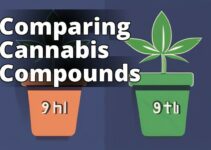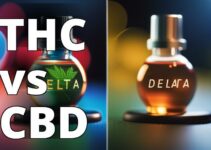What readers will learn:
- The chemical structures and composition of Delta-8 THC and THC.
- The differences in psychoactive effects and potency between Delta-8 THC and THC.
- The legal status, safety profile, and availability of Delta-8 THC and THC.
When it comes to cannabinoids found in the Cannabis sativa plant, such as Delta-8 tetrahydrocannabinol (THC) and delta-9 THC, there is often confusion about their similarities and differences. In this article, we will delve into a comprehensive comparison and analysis of Delta-8 THC and THC, examining their chemical composition, psychoactive effects, legality, safety, availability, and future directions. By understanding these factors, you will be better equipped to make informed decisions regarding the use of these compounds.
Chemical Structure and Composition
Delta-8 THC and THC share a similar chemical structure, both containing a chain of carbon atoms that form a ring structure. However, the placement of a double bond within this structure differentiates Delta-8 THC from THC. Delta-8 THC has the double bond on the eighth carbon atom, whereas THC has it on the ninth carbon atom.
The molecular differences between Delta-8 THC and THC contribute to variations in their effects on the body. Delta-8 THC is considered to be less potent than THC, meaning that a significantly larger dose of Delta-8 THC is required to achieve similar effects. This lower potency may be attributed to the positioning of the double bond, which affects the interaction between the compound and the body's cannabinoid receptors.
Psychoactive Effects and Potency
When comparing the psychoactive effects of Delta-8 THC and THC, it is essential to consider their potency and the dosage used. While Delta-8 THC is similar to THC in terms of its psychoactive properties, it is generally regarded as having milder effects. This means that individuals may require higher doses of Delta-8 THC to achieve the same level of psychoactivity as THC.
The specific psychoactive effects experienced may vary from person to person and can be influenced by factors such as individual tolerance, dosage, and the method of consumption. Both Delta-8 THC and THC have the potential to induce relaxation and provide pain relief. However, it is important to note that the effects of these compounds can also vary depending on the individual's physiological and psychological makeup.
Research on the therapeutic benefits of Delta-8 THC and THC is still limited, and more studies are needed to fully understand their potential applications. Some anecdotal evidence suggests that these compounds may offer relief from conditions such as anxiety, chronic pain, and depression. However, it is crucial to consult with a healthcare professional before using any cannabis-based products for therapeutic purposes.
| Aspect | Delta-8 THC | THC |
|---|---|---|
| Chemical Structure | Double bond on 8th carbon atom | Double bond on 9th carbon atom |
| Potency | Less potent | More potent |
| Psychoactive Effects | Milder effects | Stronger effects |
| Legality | Subject to debate and varies by state | Illegal at federal level, legalized in some states |
| Regulation | Varies by state | Varies by state |
Legality and Regulation
The legal status of Delta-8 THC and THC differs across jurisdictions. THC is classified as a Schedule I controlled substance in the United States, making it illegal at the federal level. However, several states have legalized the recreational and/or medicinal use of THC. It is important to be aware of the specific laws and regulations in your jurisdiction before using THC products.
On the other hand, the legality of Delta-8 THC is a subject of debate and varies from state to state. While some states have explicitly legalized Delta-8 THC, others have banned its sale due to concerns about its safety and potential for abuse. It is important to stay updated on the latest regulations in your area and to purchase Delta-8 THC products from reputable sources.
The differences in legality between Delta-8 THC and THC have implications for both consumers and businesses. Consumers should exercise caution when purchasing and using these compounds to ensure compliance with local laws. Businesses operating in the cannabis industry must navigate a complex regulatory landscape to ensure compliance and consumer safety.
Safety and Side Effects
The safety profile of Delta-8 THC and THC is an important consideration for individuals considering their use. Both compounds may have potential side effects, although the specific effects and their severity can vary between individuals. Common side effects associated with the use of Delta-8 THC and THC include dry mouth, red eyes, impaired coordination, and increased heart rate.
It is worth noting that the safety of Delta-8 THC and THC products can be influenced by factors such as product quality, testing, and regulation. To minimize potential risks, consumers should purchase products from reputable sources that adhere to strict quality control standards. Additionally, consulting with a healthcare professional is advisable, particularly for individuals with underlying medical conditions or those who are pregnant or breastfeeding.
Availability and Market Trends
The availability and accessibility of Delta-8 THC and THC products can vary depending on local regulations and market trends. THC products, particularly those with high concentrations of THC, are more widely available in jurisdictions where marijuana has been legalized for recreational or medicinal use.
Delta-8 THC products, on the other hand, may be subject to more stringent regulations or even outright bans in some areas. This can lead to limited availability and potentially higher prices for Delta-8 THC products. It is important for consumers to be cautious when purchasing these products and to ensure that they are sourced from reputable manufacturers.
The unregulated and illicit market for Delta-8 THC and THC products poses potential risks to consumers. These products may not undergo rigorous testing for quality and purity, increasing the likelihood of exposure to harmful chemicals or contaminants. To mitigate these risks, it is crucial to purchase from trusted sources and to carefully read product labels to ensure compliance with safety standards.
Research and Future Directions
Research on Delta-8 THC and THC is still in its early stages, and there is much to learn about these compounds. Continued scientific investigation is needed to better understand their long-term effects, potential therapeutic applications, and safety profiles. Researchers are also exploring the potential synergistic effects of combining Delta-8 THC, THC, and other cannabinoids such as cannabidiol (CBD).
Understanding the benefits and risks of Delta-8 THC and THC requires comprehensive research and clinical trials. Policymakers play a crucial role in supporting research efforts and establishing regulations that prioritize consumer safety. By providing a conducive environment for research and education, policymakers can promote responsible use and help consumers make informed decisions.
Personal Experience: The Therapeutic Benefits of Delta-8 THC
As a person who has struggled with anxiety for many years, I have always been on the lookout for alternative treatments that could provide relief without the side effects of traditional medications. This led me to discover Delta-8 THC, a compound that has shown promise in reducing anxiety and promoting relaxation.
A few months ago, I decided to give Delta-8 THC a try. I purchased a reputable Delta-8 THC product from a licensed dispensary and followed the recommended dosage instructions. Within about 30 minutes, I began to feel a sense of calm wash over me. My racing thoughts started to slow down, and I felt a wave of relaxation come over my body.
What impressed me most about Delta-8 THC was its ability to provide relief from anxiety without making me feel overly intoxicated or impaired. Unlike its cousin THC, which can sometimes induce feelings of paranoia or anxiety, Delta-8 THC seemed to have a more gentle and manageable effect. I was able to go about my day without feeling overly sedated or out of touch with reality.
Over time, I noticed that my overall anxiety levels had decreased. I felt more in control of my thoughts and emotions, and I was better able to navigate stressful situations without becoming overwhelmed. Delta-8 THC became an invaluable tool in my anxiety management toolkit, providing me with the relief I had been searching for.
Of course, it's important to note that my experience with Delta-8 THC may not be the same for everyone. Each individual is unique, and what works for one person may not work for another. It's always essential to consult with a healthcare professional and start with a low dosage to gauge your body's response.
In conclusion, my personal experience with Delta-8 THC has been overwhelmingly positive. It has provided me with a natural and effective way to manage my anxiety, allowing me to live a more balanced and fulfilling life. I believe that with further research and understanding, Delta-8 THC has the potential to help many others struggling with anxiety and other related conditions.
Comparison with CBD
In addition to Delta-8 THC and THC, another cannabinoid that has gained significant attention is cannabidiol (CBD). Unlike Delta-8 THC and THC, CBD is non-psychoactive, meaning it does not produce mind-altering effects. CBD is generally considered safe and has been studied for its potential therapeutic benefits in various conditions, including epilepsy, anxiety, and pain management.
When comparing Delta-8 THC and THC with CBD, it is important to note the differences in psychoactive effects and therapeutic benefits. While Delta-8 THC and THC can induce psychoactivity and alter brain function, CBD does not have these effects. CBD is primarily recognized for its potential anti-inflammatory, analgesic, and anxiolytic properties.
Some individuals may choose to combine Delta-8 THC, THC, and CBD to potentially harness the unique effects of each compound. However, it is crucial to consult with a healthcare professional before combining these substances, as their interactions and effects on the body can vary.
Conclusion
In conclusion, Delta-8 THC and THC are two compounds found in the Cannabis sativa plant that differ in their chemical structures and psychoactive effects. While Delta-8 THC is considered less potent than THC, both compounds have the potential to produce psychoactive effects and offer therapeutic benefits. The legality and regulation of these compounds vary across jurisdictions, and consumers should be aware of the laws in their area.
Safety is a crucial aspect to consider when using Delta-8 THC and THC products. Purchasing from reputable sources and understanding product labels can help mitigate potential risks. Additionally, further research is needed to fully understand the long-term effects and benefits of these compounds.
When making decisions about the use of Delta-8 THC and THC, it is essential to stay informed about regulatory changes and research advancements. By staying updated and engaging in responsible use, individuals can navigate the complex landscape of cannabis-based products and make informed choices about their health and well-being.
For additional information on the potential benefits and risks of Delta-8 THC and THC, we recommend referring to the following resources:
- The FDA's consumer update provides comprehensive information about the potential health risks of delta-8 THC and emphasizes the importance of reporting complaints and adverse events.
- An article published on The Conversation discusses the potential benefits of delta-8 THC for relaxation, pain relief, and anxiety reduction, highlighting the limited research and safety concerns associated with its use.
Remember to consult with a healthcare professional before using any cannabis-based products, and always prioritize your safety and well-being.





